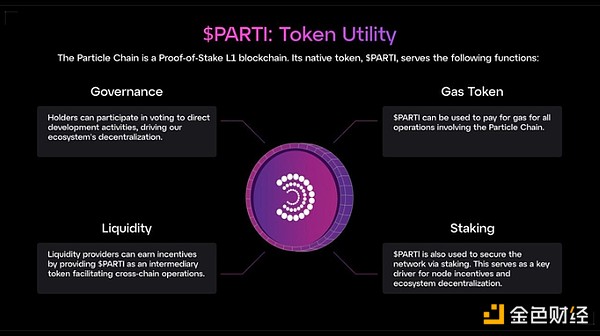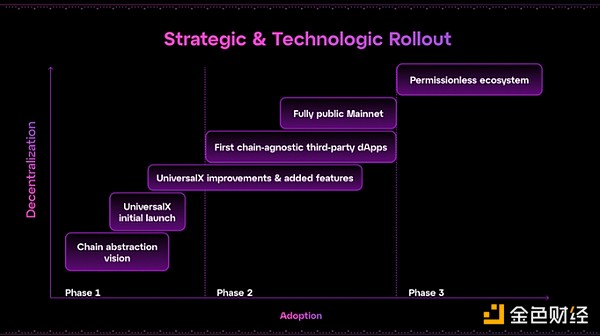Source: Binance official website, Particle Network official website, white paper; Compiled by: Golden Finance
On March 24, 2025, according to Binance's official announcement, Binance HODLer airdrop has launched the 13th project Particle Network (PARTI).
Binance will launch PARTI at 21:00 on March 25 (Eastern Time 8), and open PARTI/USDT, PARTI/USDC, PARTI/BNB, PARTI/FDUSD and PARTI/TRY trading pairs.
1. PARTI HODLer Airdrop Details:
Token Name: Particle Network (PARTI)
Genesis Token Total Supply: 1,000,000,000 PARTI
Maximum Token Supply: 1,000,000,000 PARTI
Total HODLer Airdrop Tokens: 30,000,000 PARTI (3% of Maximum Token Supply)
Additional 30,000,000 PARTI will be distributed to HODLer airdrops in batches six months after spot listing; detailed rules will be announced separately.
Circulating supply at Binance listing: 233,000,000 PARTI (23.3% of max token supply)
Smart contract/network details: Binance Chain and Base (0x59264f02D301281f3393e1385c0aEFd446Eb0F00)
Listing fee: 0
Research report: Particle Network (PARTI) (Research report will be available within 24 hours of this announcement)
BNB holding hard cap: Average BNB holdings per user / Total average BNB holdings*100% ≤ 4%, (if the holding ratio is greater than 4%, the BNB holding ratio will be calculated as 4%)
II. PARTI Project Introduction
Particle Network is a Layer-1 blockchain that supports chain abstraction, seamlessly unifying users and liquidity on Web3. At its core is the universal account, which provides users with a single account and unified balance across all chains. These accounts are coordinated and protected by the Particle Network, ensuring a frictionless experience for the entire Web3 ecosystem.
Particle will enable billions of users to seamlessly join and interact with dApps on each chain, becoming the foundation for mass adoption and playing an indispensable role in unifying the open network.
Ultimately, the $PARTI token will power the economy of the Particle Network and its underlying infrastructure.
Particle Network was launched in 2022, initially as a wallet abstraction service provider, enabling users to create wallets linked to their Web2 social accounts, which can then be used natively in interfaces embedded in dApps.
Particle's solution also covers the Bitcoin ecosystem through BTC Connect, which is used by all major BTC layer 2 blockchains. BTC Connect enables native BTC wallets to act as signers for Particle AA wallets on BTC L2. This allows users to sign and authorize transactions on Smart Accounts using only native Bitcoin wallets (such as UniSat) without relying on other products.
After more than 30 million wallet activations and more than 7,000 dApp integrations, Particle Network has taken the next step in its evolution with the launch of Universal Accounts to support chain abstraction, taking Web3 to the next level in terms of user experience.
In addition, Particle has built the first chain-agnostic mainnet application: UniversalX using Universal Accounts.
III. PARTI Token Economics
Particle Network's $PARTI token is at the heart of the Particle Chain and its ecosystem economy. It is designed to simplify the user experience by powering Universal Gas while facilitating seamless settlement on Particle Chain as an exchange mechanism for Universal Liquidity. As a PoS network, Particle Chain relies heavily on $PARTI and L1 nodes to build a secure foundation for Particle Network and serve as the network's sole governance token.
The total supply of $PARTI is fixed at 1,000,000,000 tokens, with a structured release schedule designed to promote a deflationary economy and ensure long-term token scarcity.

Three major functions of PARTI tokens
Staking and governance. $PARTI holders can participate in ecosystem voting within the Particle Network, contribute to the development of the network and determine its direction. This also achieves native decentralization at the governance level.
Universal Gas Token. $PARTI is the native Gas token of Particle Network and the base Gas token used by general accounts. All Gas fees paid by users on any chain are ultimately settled on $PARTI.
General liquidity token. $PARTI also serves as the settlement and intermediate token for liquidity providers (LPs) within Particle Network, participating in cross-chain atomic swaps and earning transaction fees.

Fourth, PARTI Roadmap
Universal accounts connect developers and users of all chains to create a borderless multi-chain ecosystem.
In order to promote the development of Web3 by adopting chain abstraction, Particle Network will also gradually develop and incubate high-quality applications. This process will be divided into three phases:
Permissioned Ecosystem (Q1, 25): Currently, the Particle Network team is building core, high-quality applications leveraging universal accounts. UniversalX has been launched as the first chain-agnostic mainnet application, supporting on-chain transactions using combined balances from each chain. In the future, to continue to cultivate its ecosystem, Particle will launch two more chain-abstract applications covering foundational use cases.
Collaborative Ecosystem (Q3, 25): In this phase, Particle Network will work with key ecosystem partners to leverage universal accounts in existing and new applications in key verticals such as AI, trading, and stablecoins.
Permissionless Ecosystem (Q1, 26): In this phase, any ecosystem participant can integrate universal accounts permissionlessly. Public chains will be able to deploy UA into their ecosystems to connect to the Particle Network. Similarly, any application developer can integrate them into their dApps, allowing their users to enjoy the best experience on any application and public chain.

 Jasper
Jasper






